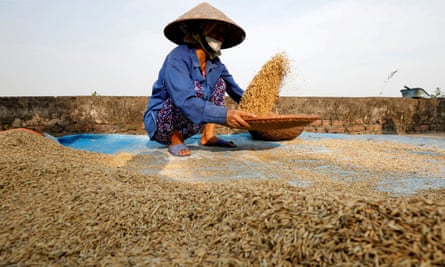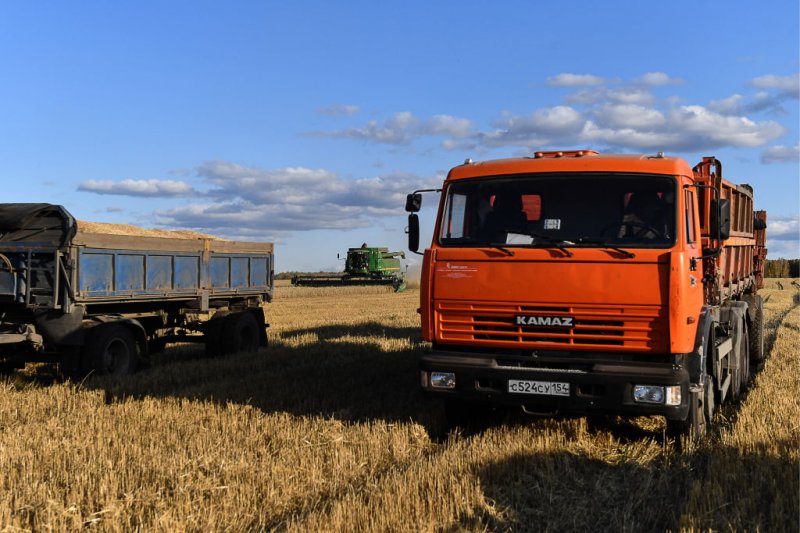Pandemic Siege - Food Insecurity
"We are going to see more nationalistic food systems and attempts at food self-sufficiency.""But I think that's mostly political, sending signals to people that the state is actively seeking to protect them and is doing all it can to ensure food security.""For any countries, food self-sufficiency is elusive."Rami Zurayk, Professor, American University of Beirut"Would some of you [newly-unemployed in Quebec] be tempted to come work with our farmers, in our fields?""We were worried, in the past month, that we wouldn't be able to get the fruits and vegetables we import from the south."Quebec Premier Francois Legault, press conference"It is a hammer blow for millions more who can only eat if they earn a wage.""It only takes one more shock -- like COVID-19 -- to push them [insecure consumers] over the edge."Arif Husain, senior economist, World Food Program
 |
| Vietnam, the third biggest rice exporter, has suspended contracts in the wake of the crisis. Photograph: Nguyen Huy Kham/Reuters |
Like
United Nations agencies and the European Union, organizations around
the world agreed in a report published recently that social and
political unrest world 'round is on the rise once again with the
coronavirus crisis fuelling discontent in the face of food shortages,
job losses and lockdowns. Normal civic life everywhere on the planet has
been disrupted and peoples' fears in the face of this new reality
bearing scant resemblance to what they're accustomed to, brings back
haunting fears of straitened access to food sources.
In
March, when the spectre of a rampant viral disease was yet in its early
stages, Phil Hogan, trade chief for the European Union, had pronounced
with confidence:
"There is no global supply shortage at this time and such measures [as
disparate nations considering curbing shipments abroad to ensure
domestic supplies] are completely unjustified." By mid-April, EU trade ministers were debating how to advance the EU's "strategic autonomy", leading European Commission President Ursula von der Leyen to speak of reducing dependency by "shortening and diversifying supply chains".
The
world is struggling to come to grips with a once-in-a-century pandemic,
while the public in disbelief views empty supermarket shelves and panic
buying in wealthier countries keeps those shelves emptied even while
middle class homes suddenly develop a taste for home-baked bread to
allay fears of bread shortages. Ukraine, not among the wealthy nations
has, as a major breadbasket, limited grain exports. The world's
third-larges rice shipper, Vietnam, now bars exports of rice.
Restrictions
on overseas sales of grains or rice have been introduced in about ten
countries since mid-March, according to the International Food Policy
Research Institute (IFPRI) tracker. Governments are beginning to sit up and take notice. "Food is a pretty emotional topic when there is not enough of it", senior research fellow at the Washington-based IFPRI, Joseph Glauber remarked drily.
 |
| Labour supply fuels food shortage fears. Food Navigator |
"Being rich is no longer a guarantee that you will be able to get the supply you want on difficult markets",
observed Tim Benton, research director in emerging risks at think tank
Chatham House in London. This, despite that food experts have no problem
agreeing that more than enough grain is stored worldwide, along with
adequate stockpiles of key food staples. It is, on the other hand,
distribution networks that are causing a perceived shortfall.
Distribution
bottlenecks triggered by lockdowns. But enough of a public scare has
communicted to governments to influence some nations to boost their
agricultural sector. The 2020 book by Tim Lang, professor of food policy
at London's City University, Feeding Britain,
raised the alarm that the United Kingdom's flawed system of importing
vast amounts of crops has fuelled a public alarm. An increase of local
food production by 2030 is visualized by Singapore which set up a task
force to ensure just that.
| Jakob Weyde / Shutterstock.com |
Countries
have been urged to keep trade flowing by a group of food industry
figures, to prevent a growth in global hunger. The United Nations is
urging states to work together in avoidance of "beggar-thy-neighbour policies".
The former communist nations of Romania and Kazakhstan are among those
that have increased grain exports in recent years, but now talk about
keeping their food at home, recalling memories of food scarcity during
communist rule.
When
Russia, ordinarily a big grain exporter, panicked in response to
harvest failures in 2010, exports became severely limited. Across Africa
and Asia political and economic instability saw people struggling to
cope between 2008 and 2010, leading originally to the Arab uprisings in
the Middle East, which eventually led to the refugee crisis and the
spread of malnutrition. Now, once again, in the face of the global
pandemic Russia has halted its exports of grain.
 |
| Russia halts wheat exports, deepening fears of global food shortages, April 2019.
Harvesting wheat grains in a field of the Posevninskaya poultry farm in Cherepanovo District in September 2019.
Kirill Kukhmar–TASS/Getty Images
|
Labels: Food Distribution, Food Scarcity Fears, Food Self-Sufficiency, Food Stocks, Globalism, Nationalism, Novel Coronavirus
0 Comments:
Post a Comment
<< Home